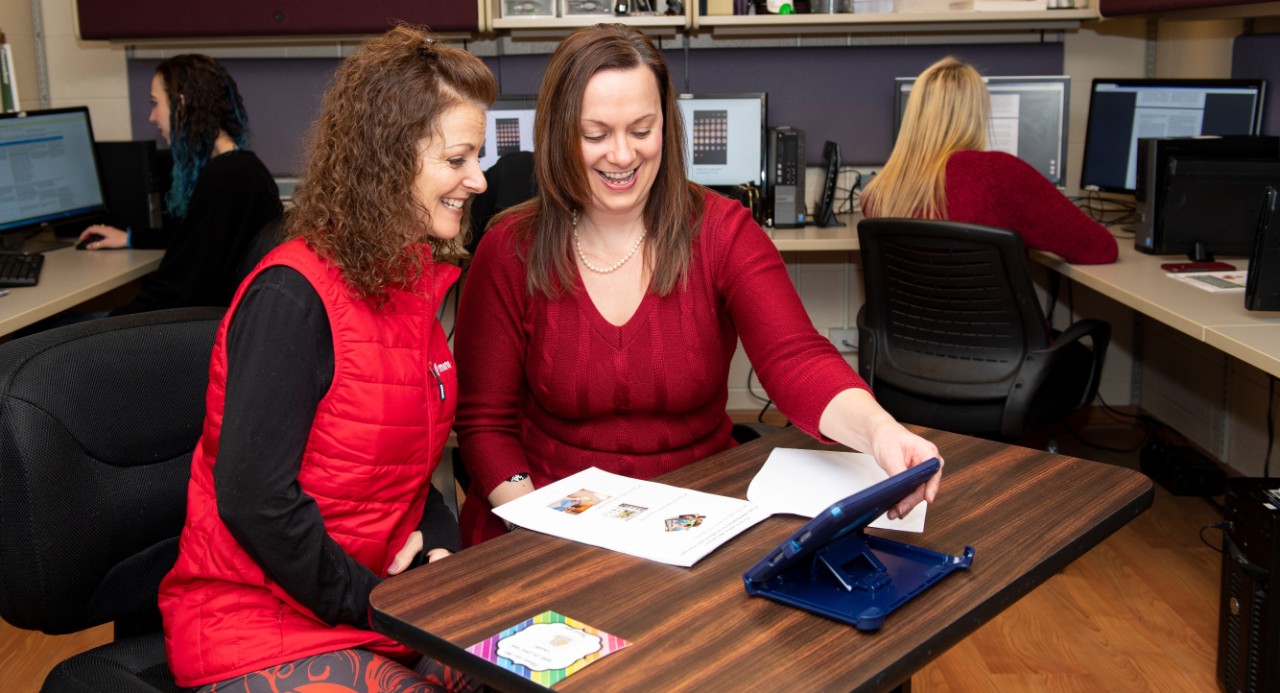
UC Allied Health Sciences faculty presents at 'world's largest general scientific conference'
Presentation emphasized the importance of personalizing augmentative and alternative communication
Aimee Dietz, PhD, associate professor in the Department of Communication Sciences and Disorders in the University of Cincinnati (UC) College of Allied Health Sciences, co-presented a panel discussion at the American Association for the Advancement of Science (AAAS) annual conference in Washington, Feb. 14-17. The session was titled “Talking Without Speaking: Transcending Communication Boundaries With Technology.”
Each year at the AAAS annual meeting scientists, educators, policymakers and journalists gather to discuss cutting-edge developments in science, technology and policy. The meeting is marketed as the world’s largest general scientific conference, with more than 200 events, including panel discussions, keynote speakers and symposia.
Dietz worked with Cathy Binger, PhD, associate professor in the Department of Speech and Hearing Sciences at the University of New Mexico and Jonathan Brumberg, PhD, assistant professor in Speech-Language-Hearing: Science Disorders at University of Kansas to put together the session. The three brought a diverse research background to the discussion, including accessing language after a stroke and developments in technology that aid, restore and unlock communication for people with communication disorders.
Millions of people of all ages are impacted by developmental or acquired communication disorders and those with disorders are significantly more limited in their ability to communicate, according to Dietz. Developments in technology are creating more ways to help people use augmentative and alternative communication (AAC) and their discussion focused on these emerging high- and low-tech solutions that are improving the lives of those with communication disorders. Dietz and her colleagues emphasized the importance of combining technology and personalization with instruction to ensure successful implementation of AAC across the lifespan.
Dietz has done extensive research in aphasia, a language impairment affecting 250,000 people per year. Up to 50 percent of those who suffer a stroke will experience aphasia, and AAC apps are often used to replace lost language after a stroke, according to Dietz.
“However, those apps can also exploit intact visual processing systems to access the brain’s language centers and stimulate language recovery in stroke survivors,” says Dietz. “My research agenda is focused on helping people with aphasia learn how to use technology to cue themselves when words fail them. Everyone uses AAC every day, each time we use our smart phones to connect via our pictures and social media.”
Dietz says her path to this conference began about a year ago when she was contacted by the American Speech-Language Hearing Association. Each year, the organization supports one or two submissions to be featured at the AAAS annual conference and this year wanted to focus on AAC.
“It’s a very unique conference,” says Dietz, who is also director of the UC Language Recovery and Communication Technology Lab. “You’re not talking to clinicians, you’re not talking to researchers, you’re talking to members of the media and people from other scientific areas.”
Dietz is currently working on a nearly $500,000 National Institutes of Health award to increase knowledge of how assistive technology interventions can be used to help people with aphasia restore language function. The project will also help identify regions of the brain responsible for these changes.
Featured image at top: Aimee Dietz, PhD, using an iPad with a communication app to facilitate spoken language and auditory comprehension for Terri Kersey, a stroke survivor with aphasia. Photo/Colleen Kelley/UC Creative Services.
Related Stories
Before the medals: The science behind training for freezing mountain air
February 19, 2026
From freezing temperatures to thin mountain air, University of Cincinnati exercise physiologist Christopher Kotarsky, PhD, explained how cold and altitude impact Olympic performance in a recent WLWT-TV/Ch. 5 news report.
Discovery Amplified expands research, teaching support across A&S
February 19, 2026
The College of Arts & Sciences is investing in a bold new vision for research, teaching and creative activity through Discovery Amplified. This initiative was launched through the Dean’s Office in August 2024, and is expanding its role as a central hub for scholarly activity and research support within the Arts & Sciences (A&S) community. Designed to serve faculty, students, and staff, the initiative aims to strengthen research productivity, foster collaboration, and enhance teaching innovation. Discovery Amplified was created to help scholars define and pursue academic goals while increasing the reach and impact of A&S research and training programs locally and globally. The unit provides tailored guidance, connects collaborators, and supports strategic partnerships that promote innovation across disciplines.
UC Digital Futures and Cincinnati Fire Museum launch educational video game
February 17, 2026
A new collaboration between the University of Cincinnati's Digital Performance Lab (DP Lab), CCM Acting, UC's School of Information Technology, and the Cincinnati Fire Museum is using gaming technology to bring essential fire safety education to children. The project titled Fire Escape is an interactive video game designed to teach K-12 students how to respond safely during a house fire. It was developed through Digital Futures research support, student game development, and guidance from local fire safety professionals.
